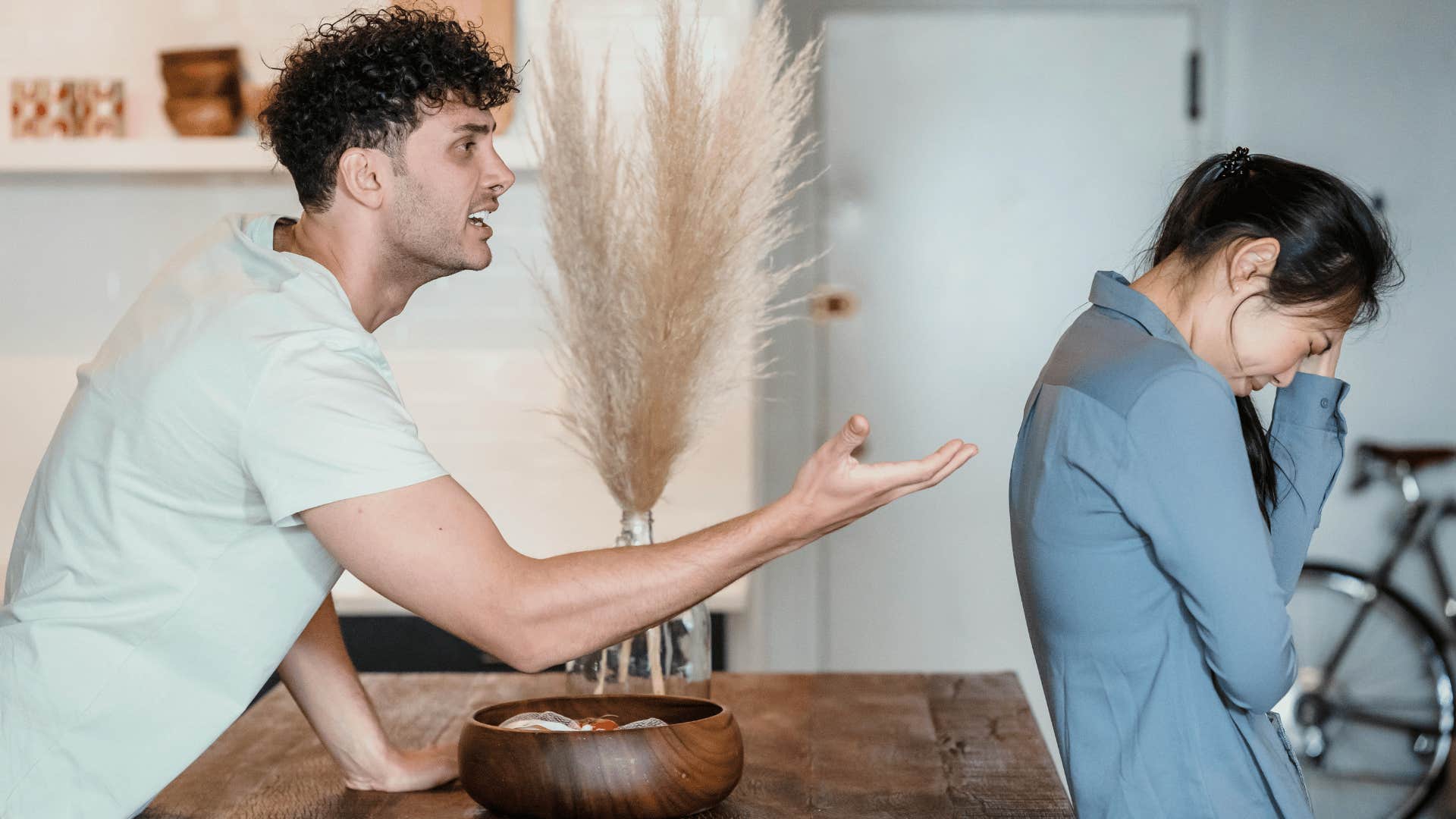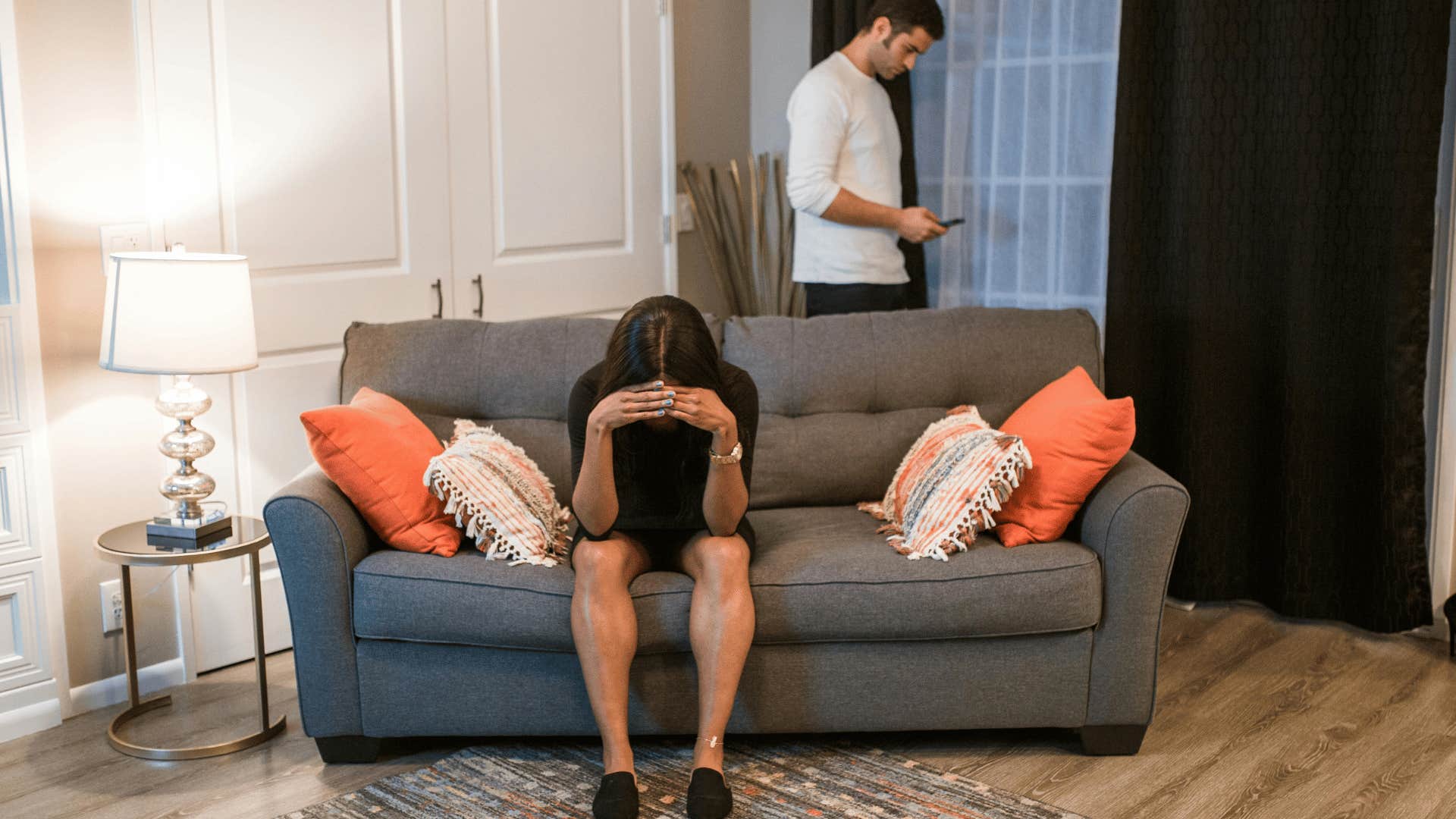5 Micro Signals Men Give Off When They're Quietly Abusing You, According To Psychology
These small, easy-to-miss signs can reveal when a man is trying to control you without ever raising his voice.
 Alexander Augero | Unsplash
Alexander Augero | Unsplash Are you seeing the signs of a toxic relationship and wondering what's going on? Do you look around at other people in happy relationships and wonder if yours is one of the good ones?
Unfortunately, it’s hard to know when our relationships are toxic. We're too close and too deep in it, and love can blind us in many ways. Fortunately, if you know what to look for, you can spot relationship red flags of quiet abuse, get yourself out, and learn how to avoid another one in the future.
Here are five micro signals men give off when they're quietly abusing you, according to psychology:
1. He makes you walk on eggshells
 Timur Weber / Pexels
Timur Weber / Pexels
I have a client who's very confident out in the world — he speaks up for what he wants, is sure of his actions, and feels good about himself.
In contrast, when he's home, he feels unsafe and unsure. In the presence of his wife, he's quiet, knowing that if he says or does something she doesn’t like, she'll yell at him.
He doesn’t take on projects around the house without her direction, because he's worried that he might do the wrong thing. He spends more time in the garage knowing that if he's out of sight, he's out of danger.
Are you walking on eggshells around your partner? Are you vigilantly careful not to do anything that might upset them? Do you go out of your way to make them happy, more than what you think is normal?
If the answer is "yes" to any of these questions, it's a clear red flag that your relationship is toxic. No one should feel uncomfortable being themselves in any relationship. It's time you took a good look at yours and see how you fit in.
2. He makes you doubt your worth
 Liza Summer / Pexels
Liza Summer / Pexels
Many people in a toxic relationship no longer feel good about themselves. In some cases, it’s because they're walking on eggshells — and that makes them lose their self-confidence.
In other cases, they don’t feel good about themselves because their partners belittle them, in big and small ways, over and over and over.
I have a client whose husband never has a kind word to say about her. He never compliments her on how she looks, the dinner she cooked, or how successful she is in her job.
Sometimes, he's just silent, saying nothing, which hurts her deeply. And sometimes, he's very direct, telling her that her dress is horrible or that it’s just luck that she does well at work.
These kinds of direct and indirect attacks have slowly, over time, destroyed her self-esteem. She no longer believes that she's the amazing person that other people think she is.
Are you struggling with self-esteem issues brought about by your relationship? If yes, it's a sign that you should consider leaving.
Research has shown that emotional abuse often starts subtly and gradually, making it difficult for the victim to recognize the harmful patterns initially. This slow erosion of self-worth can be more damaging than overt abuse because it can leave the victim questioning their perceptions and sanity.
3. He takes a toll on your health
 Photo By: Kaboompics.com / Pexels
Photo By: Kaboompics.com / Pexels
Back when I was unhappily married, I was always struggling with health issues. I developed allergies to foods — some of them were psychosomatic.
I was debilitated by a yeast overgrowth that led to fibromyalgia. I struggled with chronic pain in my body and constant depression. I was falling apart.
When you're in a toxic relationship, it takes an effect on your physical health. If one exists in a state of being constantly on edge, being cut down by their partners, and not being loved, it's impossible to maintain good health.
Even if you're exercising regularly and eating well, the chances of you struggling with health issues if your relationship is toxic are significant.
Do you have chronic health issues? It could be a sign that your relationship is toxic. Not only should you see a doctor, but perhaps it’s time to consider to next steps to get your health back.
The chronic stress associated with this type of abuse can manifest in physical symptoms like headaches, stomachaches, and chronic pain. Research shows that the mental and emotional health directly impacts your send of security and value.
4. He's hooked on something
 Alex Green / Pexels
Alex Green / Pexels
One of the biggest relationship red flags to pay attention to is signs of substance abuse. Usually, when people are living in a deeply unhappy place, they look for ways to manage their unhappiness.
In an ideal world, people would manage their unhappiness in healthy ways, like exercise and therapy. In this tough world that we live in, however, many people turn to substances to manage their moods.
Ironically, abusing substances can make a toxic relationship worse. Drug and alcohol abuse weakens filters, and often people say and do things inebriated that they might not necessarily do in a sober state.
Problems that seem manageable suddenly become less so. Tempers flare, and emotional and physical abuse can ensue. If both partners are abusing substances, things can escalate quickly and cause damage that can't be repaired.
Abusing substances can also lead to depression. When you're depressed, dealing with another person is even harder, and feeling good about yourself is impossible.
Even if your partner isn’t abusing substances, you doing so is a red flag that things need to change.
Noticing a partner's substance abuse can trigger a realization that the relationship may be characterized by manipulation and control, which are hallmarks of covert emotional abuse. Research has concluded that this combination creates a challenging and complex situation for the person experiencing it.
5. He keeps you from your friends and family
 RDNE Stock project / Pexels
RDNE Stock project / Pexels
A client of mine was in a toxic relationship. It took a long time for him to notice, but he realized that all of their friends had fallen away, leaving them alone and struggling.
Think about couples you know who are in unhappy relationships. Are they fun to be with? If you choose to go out to dinner, would you invite them along? Does time spent with them make everyone uncomfortable and on edge?
Are you this couple to your friends? The one no one likes to hang out with anymore?
Even if you're still invited to places as a couple, your individual friends may pull away from you if you are in a toxic relationship.
If all you want to do is talk about how unhappy you are and how much your partner sucks, just talking about it and not taking steps to fix it, you might find that your friends have less of an inclination to spend time with you.
Life is hard enough without having to be constantly dragged down by an unhappy friend.
So, take a look at your friendships. Are your couple friends still inviting you to do things? Are your personal friends making excuses to not spend time with you?
If the answer to either of those questions is "yes," you might be in a toxic relationship. Perhaps, it’s time to take a good, hard look at trying to fix it or get out.
Knowing these relationship red flags is an essential way of both escaping from a toxic relationship and preventing a new one.
In a toxic relationship, it's often hard to pick out these signs because it's the reality 24/7. But, having some clear signs to look out for — instead of simply relying on your feelings — can help you figure out your next steps.
So, if you find yourself walking around on eggshells, trying not to upset your partner if your self-esteem and your health are flagging, if one or both of you is abusing substances, and if you're losing your friends, you need to address these issues now so that you can get your life back.
That prospect appears daunting, but you only have one life to live, and living it the way you are now isn’t serving you in any way. Reach out to a therapist or a life coach, and see what you can do to help heal your relationship or to help you walk away.
Mitzi Bockmann is a NYC-based Certified Life Coach who works with individuals who strive to heal their toxic relationships so they can have their happily ever after. Mitzi's bylines have appeared in The Good Men Project, MSN, PopSugar, Prevention, Huffington Post, Psych Central, among many others.

